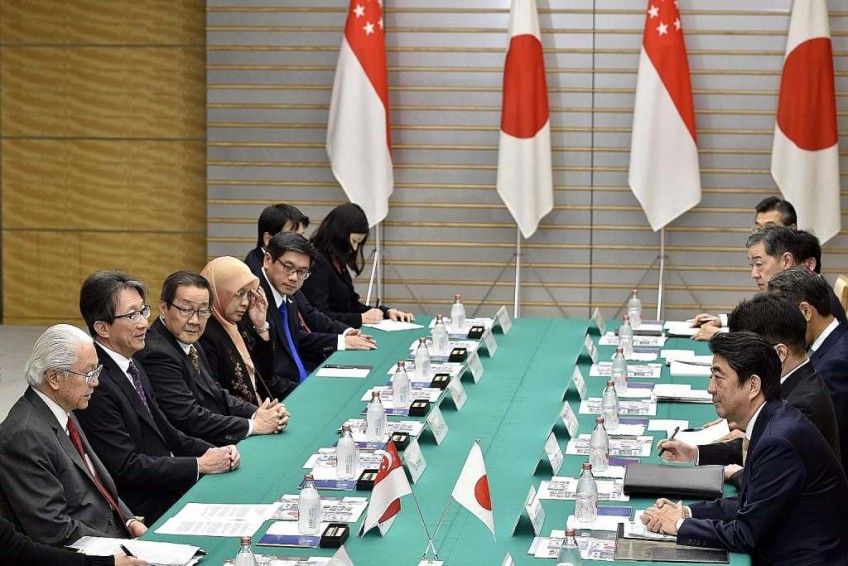Singapore and Japan urge ratification of TPP

In their latest call against protectionism, Singapore and Japan said they hope the 12-nation Pacific trade pact can be ratified and entered into force as soon as possible.
Both countries are part of the Trans-Pacific Partnership (TPP), whose future is uncertain after Mr Donald Trump, who has said he will disavow the treaty, was elected United States President last month.
The issue was on the agenda at a summit meeting between Singapore President Tony Tan Keng Yam and Japanese Prime Minister Shinzo Abe last night.
"We discussed the economic and strategic importance of the TPP, and agreed that it is in the interest of all TPP partners to ensure that the TPP is ratified and enters into force expeditiously," Dr Tan told reporters after the summit.
He is in Japan for a nine-day state visit.
Leaders including Mr Abe and Singapore Prime Minister Lee Hsien Loong have stressed the strategic importance of the TPP, seen as a linchpin of the US pivot to Asia.
Singapore will amend its laws to bring the TPP into effect by early next year, while the pact has been approved by Japan's Lower House and is now before the Upper House.
Said Mr Abe, who has invested much domestic political capital into realising the pact: "We agreed to continue to work together for the early entry into force of the TPP as well as the conclusion of RCEP negotiations so as not to reverse the trend of free trade."
RCEP refers to the China-led 16-nation Regional Comprehensive Partnership Agreement, which does not include the US. Singapore and Japan are involved in the RCEP, and Dr Tan also urged the "timely conclusion" of its negotiations.
With Singapore and Malaysia expected to sign an agreement for a high-speed rail project soon, Mr Abe expressed his hopes to "see progress in the adoption" of Japanese bullet train technology.
Read also: PM Lee urges US to ratify TPP, or lose credibility
Dr Tan urged Japan to put in a competitive bid when an international tender is called "in due course".
"Singapore recognises the long record of safety, reliability and efficiency of Japanese technology," he said. "Singapore and Malaysia will work together to ensure a vigorous, objective and transparent tender process, so as to achieve our common interests in having the best technology for the project."
Both leaders noted robust ties in myriad areas such as politics, economy and culture as the nations celebrate 50 years of diplomatic ties.
Next year, the two sides will convene their first vice-ministerial transport forum - mooted by Mr Abe and Mr Lee - through which Dr Tan urged the expansion of a bilateral Air Services Agreement to further develop Changi and Narita into regional airport hubs.
The two central banks also inked on Wednesday a three-year local currency bilateral swap agreement, the two leaders noted.
After the meeting, Mr Abe hosted Dr Tan to a banquet, where Dr Tan urged continued co-operation to tackle common challenges such as ageing populations.
On the menu was a unique cocktail - the "Sakura Sling".
Mr Abe joked of the concoction of Singapore Sling and Dasai Sake from Yamaguchi prefecture, his home town: "I've never tasted (this) before, but I'm sure after you have a sip of this drink, you'll have a good sleep tonight and can find Mount Fuji and the Merlion in your dreams."
Read also: TPP breakdown a setback for trade thrust of Singapore's future economy

This article was first published on Dec 02, 2016.
Get a copy of The Straits Times or go to straitstimes.com for more stories.